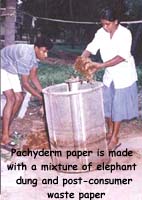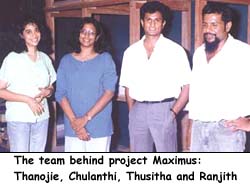 |
 5th July 1998 |
Front Page| |
Dung PaperFew would associate elephant dung with recycled paper. But the Kegalle based 'Project Maximus' has successfully used the jumbo raw material on their doorstep and also other eco-friendly substances - paddy husk and illuk grass in their venture By Ayesha Reza RafiqWhile Sri Lanka has the resources to be eco-friendly, what's often lacking is the will to be so. Most people are either too busy, too lazy to help save the environment, or simply don't care. Not so this group of four. They have come up with a product which, they hope, will appeal to those who truly love our country and recognise its urgent needs.
Thusitha Ranasinghe came up with the idea after having read a five line news item in a local newspaper last June of a wild life ranger in Kenya who was following a similar method using the ancient Egyptian technique of papyrus scroll making. Thusitha, who had always wanted to produce handmade paper, decided he would try his hand at it. So, together with three likeminded friends, Ranjit Serasinghe, Thanojie Samarasinghe and Chulanthi Mathew, he set up the project. With the help of an Industrial Development Board consultant, they developed the technology in three months and started work soon after.
Now, where you may query does one go for elephant dung? This is where luck also played an important role. Thanojie's mother, it so happened had started a home named Club Concept, for elephants whose owners could no longer look after them, in their 'watte', in Kegalle. Although the idea of a home for elephants is relatively new, most of these elephants have been there for as long as Thanojie can remember. The elephants spend most of the day bathing in the river that runs through the estate. With the new project factory located in the estate, the elephants, in effect, pay for their keep for the rest of their lives, as it is their dung, that is used for the paper. Moreover, the raw material is right at the doorstep. Elephant dung isn't a very good fertiliser and is difficult to get rid of, says Thusitha. So if they do need more raw material in the future being situated close to the Pinnawela Elephant Orphanage, should be an advantage. The recycled paper is made out of 75% elephant dung and the rest out of waste-paper and other products, all eco friendly. The consistency and finish of the paper depends on what the elephant eats and also the animal's age, explains Ranjit. For example, paper made from the dung of an elephant who has eaten kitul or coconut leaves will have a better finish and be stronger than that made from the dung of an elephant who has eaten jak or potta leaves. Also, if the elephant is old, then it would chew its food less and its digestive tract would be weaker, and as such, the dung would be more fibrous and the paper coarser. Coming from a family business of printing, importing and stocking paper Thusitha is on familiar terrain. Thanojie, who works for a High Commission devotes her spare time to the project, as does Chulanthi, who is a housewife. Ranjit devotes all his time to Maximus, as the project is called, from the scientific name for elephants, Maximus maximus. The project, which required an expenditure of around Rs. eight lakhs was funded mainly from their personal savings. Launched on gut feeling, and minimum research, the partners seem confident of the industry's future prospects and profit generating ability, although they admit it is still in the 'groping' stage. So can this grow from a cottage industry to a large scale one? Definitely, they all agree. At the moment they employ seven people from Kegalle, and the process is semi-mechanised. Ranjit travels to the factory once a week, taking the waste paper collected from printers, etc. "The handmade paper industry has a growing market, and it is cheaper than imported mill made paper" says Thusitha. Ranjit says that expansion, if any, will only be upto a medium scale. If not, effluents and pollutants would pose a problem and the cornerstone of the project, which is eco-friendly, would disappear. While concentrating on being eco-friendly, helping the rural workers also seems to be close to their hearts. They plan to pay above average wages to the workers, provide proper insurance cover and above all respect their rights by letting them off work on traditional holidays. As Thusitha says, "we have taken the risk and the challenge to go rural, be rural and depend rural." Although pachyderm paper is their special product, it is by no means their only one. At the moment they produce three different types of paper in many different colours, using paddy husk, illuk grass and elephant dung. There are also plans for more products on the way. Presently, the products are customised and mainly targeted to the hospitality industry and the corporate world, with plans to invest in the gift-shop sector in the future. |
||
 |
More Plus * Of professional negligence * Stop polluting drinking water * Law Faculty Alumni meeting
Front Page| News/Comment| Editorial/Opinion| Business| Sports | Mirror Magazine |
|
 |
Please send your comments and suggestions on this web site to |
|
 Pachyderm
paper, is their innovative creation. Not just any paper, it is a mixture
of elephant dung and post-consumer waste paper, recycled to make paper,
in a way that's both ecologically friendly, decorative and useful.
Pachyderm
paper, is their innovative creation. Not just any paper, it is a mixture
of elephant dung and post-consumer waste paper, recycled to make paper,
in a way that's both ecologically friendly, decorative and useful. The
base of the project, in Thusitha's words, is an eco-friendly one. The technique,
as Ranjit explains, is not as mind boggling as it sounds. They collect
the dung before it decomposes, dry it, wash it to rid it of contaminants
like sand, then boil it in a solution. The whole technical process, which
involves pulping the waste paper and mixing it with the dung, lasts upto
five days.
The
base of the project, in Thusitha's words, is an eco-friendly one. The technique,
as Ranjit explains, is not as mind boggling as it sounds. They collect
the dung before it decomposes, dry it, wash it to rid it of contaminants
like sand, then boil it in a solution. The whole technical process, which
involves pulping the waste paper and mixing it with the dung, lasts upto
five days.